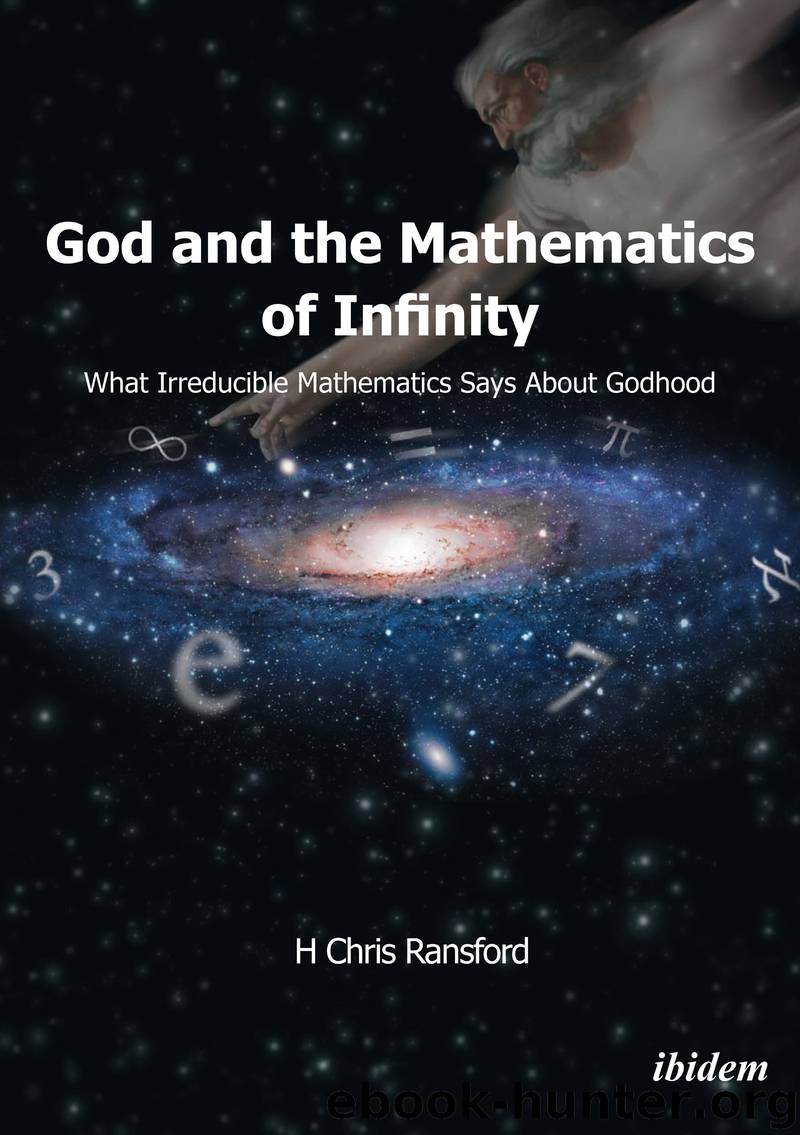God and the Mathematics of Infinity: What Irreducible Mathematics Says About Godhood by H Chris Ransford

Author:H Chris Ransford [Ransford, H Chris]
Language: eng
Format: epub
Publisher: ibidem Press
Published: 2017-05-16T16:00:00+00:00
The key point has to do with the respective cardinalities of these two categories A and B. A first reasonable assumption that we may make is that, even if category A is infinite, its cardinality is smaller than that of B, if only because at every step of the way, A selects out only one alternative from an infinite pool of alternative options. In both cases however, the respective cardinalities are still infinitely smaller than the aleph-infinity cardinality of Ananta. Since both Category A and Category B are of a lesser cardinality than Ananta, it ensues by definition that any Godhead is infinitely bigger than either category A or B.
There is also a straightforward proof that however immensely infinite Category B is, it cannot be of aleph-infinity cardinality, as follows. There is, beyond both categories A and B, a third category C, populated by the things that cannot possibly exist even in potentiality: it is, for instance, the songs that John Lennon would have written at the age of 400 years old, the operas written by Maurice Ravel when he was yet to be born, the battles that Julius Caesar could have won in the 21st century, and the like. Let's gather these impossible things up into some infinite set, the set Category C of not-even potential reality, of things that are impossible 'for aye'. But since Ananta encompasses all the sets in the wider metaverse, it also includes Category C, and hence is bigger than B. For every option within B, there are endlessly further alternatives within C. This means that we cannot match the constituent elements of Ananta one to one with those of Category B, and hence Category B is of a cardinality smaller than Ananta's.
By definition, Ananta infinity encompasses and includes all of the available layers of reality. In category B, and all the more so beyond B, we are firmly in the realm of non-existence, or of ghostlike, unactualized, as-yet unreal existence.
The fact that almost all of Ananta belongs to unreality (Categories B and higher), and that Category A could well be finite, could be interpreted by some as meaning that Ananta does not exist: under that view, Ananta would not exist because the higher-cardinality parts of Ananta would firmly belong in the realms of non-existence that are categories B and higher. Beyond the circularity of the argument (Ananta does not exist because it does not exist), it does not work. Aleph-infinity cardinality was originally defined purely mathematically, on the strength of clearly existent mathematical sets. The only way the resulting contradiction (Cantor's antinomy) could be resolved was to view Ananta as exceeding the confines of mathematics alone. If we did away with the existence of aleph-infinity, the whole edifice of even ordinary mathematics would come crashing down. For instance, the hitherto infinite series of whole numbers 1,2,3,4,5 .... (which on its own ineluctably leads to aleph-infinity and to the Ananta set, and thence to the antinomy), would have to be finite. It would end at some number, and therefore there would exist some biggest whole number.
Download
This site does not store any files on its server. We only index and link to content provided by other sites. Please contact the content providers to delete copyright contents if any and email us, we'll remove relevant links or contents immediately.
The Lost Art of Listening by Michael P. Nichols(7494)
Why I Am Not A Calvinist by Dr. Peter S. Ruckman(4149)
The Rosicrucians by Christopher McIntosh(3513)
Wicca: a guide for the solitary practitioner by Scott Cunningham(3167)
Signature in the Cell: DNA and the Evidence for Intelligent Design by Stephen C. Meyer(3132)
Real Sex by Lauren F. Winner(3016)
The Holy Spirit by Billy Graham(2944)
To Light a Sacred Flame by Silver RavenWolf(2814)
The End of Faith by Sam Harris(2733)
The Gnostic Gospels by Pagels Elaine(2527)
Waking Up by Sam Harris(2454)
Nine Parts of Desire by Geraldine Brooks(2361)
Jesus by Paul Johnson(2352)
Devil, The by Almond Philip C(2325)
The God delusion by Richard Dawkins(2305)
Heavens on Earth by Michael Shermer(2278)
Kundalini by Gopi Krishna(2180)
Chosen by God by R. C. Sproul(2161)
The Nature of Consciousness by Rupert Spira(2104)
